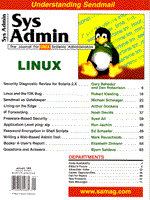
Editor's ForumWelcome to the first month of the last year before the New Millenium. Or, should that be the first of the last six months before the fiscal New Millenium? Considering that not all companies use July as the beginning of the fiscal year, your milleniage may vary. Regardless of which calendar structure your organization follows, 1999 is likely to be the year of the one-two punch from a systems perspective. Y2K problems may arise at both the turn of the fiscal year and at the end of calendar 1999. Whether that one-two punch amounts to a pair of fruit juices or a few seconds in the ring with Evander Holyfield is a matter of preparation. Considerable attention has been paid to the obvious points of Y2K failure - mostly antique COBOL programs, dating back to the days of buck-a-byte memory costs and running on mainframes, both corporate and government. As UNIX systems administrators, you may have been on the periphery of massive efforts to update such code, or right in the middle of it. Additionally, you may have been involved in search-and-destroy missions looking for bad BIOS chips and non-compliant applications on the PCs of your user community. The likelihood is that you have either replaced such chips, and upgraded the applications, or have devised a plan to do so before either of your Y2K clocks roll over. Or, perhaps you have the luxury of not being concerned with mainframes and PCs, and are basking in glow of having an additional 38 years before the UNIX equivalent of Y2K comes along. (Remember, the millisecond counter for 32-bit UNIX systems rolls over in 2038.) Either way, some of your attention should be turned to other, more-detailed aspects of the dawning of the New Millenium. Such details might include inventories of rogue user applications (software your users have loaded on their PCs, notwithstanding company policy that might forbid such practices). Such unofficial applications may only be used for diversion, but they also might form a critical part of departmental workflow. Additionally, you might be helping your users look for bad date functions in spreadsheets that play a critical role in their workflow. All too often, it is such minor details that pack major surprises, and can disrupt the way an organization does business. Now is the time to locate the little things that might turn ugly as your Y2K clocks roll over. Even less obvious are external factors that might have an effect on your operation. While the financial melt-down predicted by some doomsayers may be well beyond your control, what about such things as power? You may have heard concerns expressed by these same doomsayers about the potential problem of a Y2K non-compliant podunk power distributor shutting down major sections of the power grid. Is now the time to discuss with management that backup generator you've been thinking about? Perhaps. Although we usually think of disaster recovery as applying to fires and floods, is Y2K any less a burning question? Two quips come to mind here. The first, generally attributed to Gordon Grove, goes something like, "Just because you are paranoid, doesn't mean "they" are not after you." The other, of unknown origin, suggests that doomsayers only have to be right once. So, welcome to 1999, and be a Boy Scout. Be prepared.
Sincerely yours, P.S. The newest version of the Sys Admin CD has been released. See page 42 for details.
|